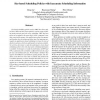Free Online Productivity Tools
i2Speak
i2Symbol
i2OCR
iTex2Img
iWeb2Print
iWeb2Shot
i2Type
iPdf2Split
iPdf2Merge
i2Bopomofo
i2Arabic
i2Style
i2Image
i2PDF
iLatex2Rtf
Sci2ools
MASCOTS
2004
2004
Size-Based Scheduling Policies with Inaccurate Scheduling Information
Size-based scheduling policies such as SRPT have been studied since 1960s and have been applied in various arenas including packet networks and web server scheduling. SRPT has been proven to be optimal in the sense that it yields--compared to any other conceivable strategy--the smallest mean value of occupancy and therefore also of waiting and delay time. One important prerequisite to applying size-based scheduling is to know the sizes of all jobs in advance, which are unfortunately not always available. No work has been done to study the performance of size-based scheduling policies when only inaccurate scheduling information is available. In this paper, we study the performance of SRPT and FSP as a function of the correlation coefficient between the actual job sizes and estimated job sizes. We developed a simulator that supports both M/G/1/m and G/G/n/m queuing models. The simulator can be driven by trace data or synthetic data produced by a workload generator we have developed that...
| Added | 31 Oct 2010 |
| Updated | 31 Oct 2010 |
| Type | Conference |
| Year | 2004 |
| Where | MASCOTS |
| Authors | Dong Lu, Huanyuan Sheng, Peter A. Dinda |
Comments (0)

